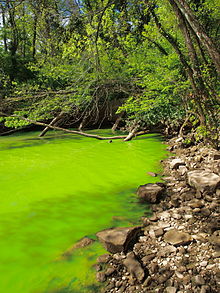
Example of Algae Bloom in Surface Water
Across the country, drinking water systems are facing enormous costs handling excess nutrient levels in their water supplies. Spending millions to drill deeper wells or upgrade treatment systems is becoming increasingly common and to help communities face the challenge of nutrient pollution, chemicals, and sediment the new Farm Bill provides at least $4 billion for source water protection over the next ten years. Signed by the President on December 20, 2018, the Farm Bill directs the U.S. Department of Agriculture (USDA) conservation programs to make source water protection a priority and directs them to assist farmers, ranchers, and forest landowners with developing projects to enhance the environment. The USDA is also directed to work closely with drinking water utilities to identify and prioritize areas that need source water protection.
Having a seat at the table with the USDA’s Natural Resources Conservation Service (NRCS) will enable utilities to help decide how, where, on what, and how much of the conservation funds go to source water protection. Utilities are encouraged to participate at the local level with NRCS state technical committees and local working groups to discuss and prioritize source water protection needs in their area. Interested utilities are encouraged to contact their local NRCS office and tell them what their concerns are and express their interest in exploring possible collaborative solutions. Utility managers are also encouraged to contact their local Conversation District and ask about their programs and opportunities to partner on source water project projects. Here are a few examples of conservation programs that offer utilities opportunities for partnerships.
Regional Conservation Partnership Program (RCPP)
Entities partner with producers to address soil, water, wildlife, and natural resource concerns at the regional and watershed level.
Conservation Innovation Grants (CIG)
CIG funds the development of the tools, technologies, and strategies to support next-generation conservation efforts.
National Water Quality Initiative (NWQI)
Working with landowners to implement conservation practices in priority areas to increase water quality.
NRCS Water Quality Landscape Initiatives
Uses landscape conservation initiatives to accelerate the benefits of voluntary conservation programs, such as cleaner air and water.
Edge-of-Field Monitoring
Offers funding to assist in monitoring water quality at the edge of the producer’s fields to gauge the effectiveness of conservation practices.
For more information, please contact Craig Erickson, Grants Manager, at (406) 495-6189 or [email protected].

